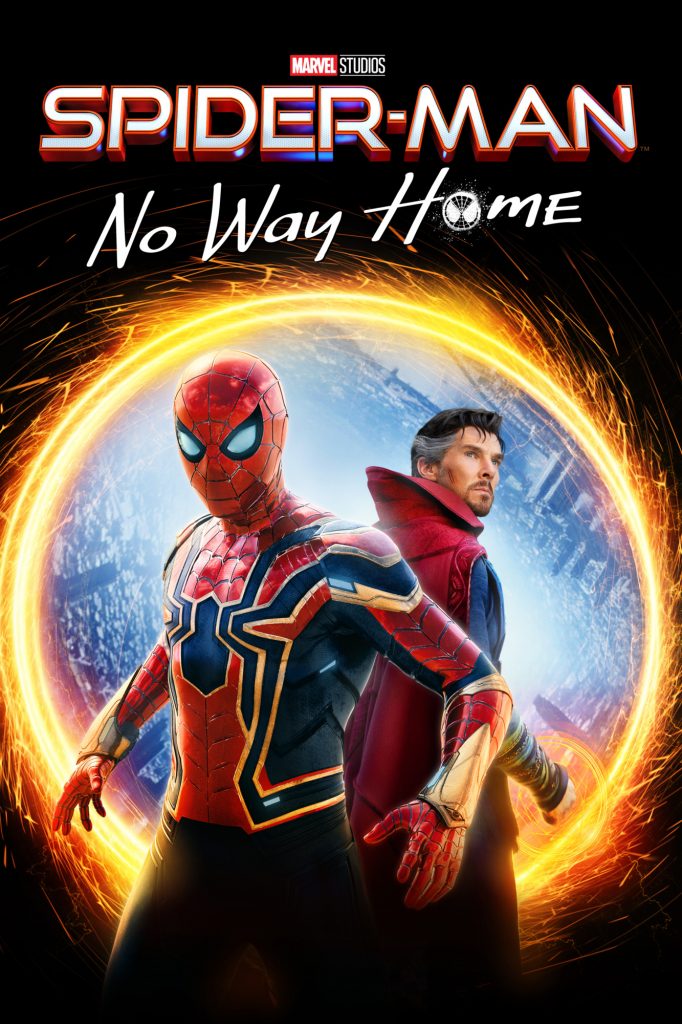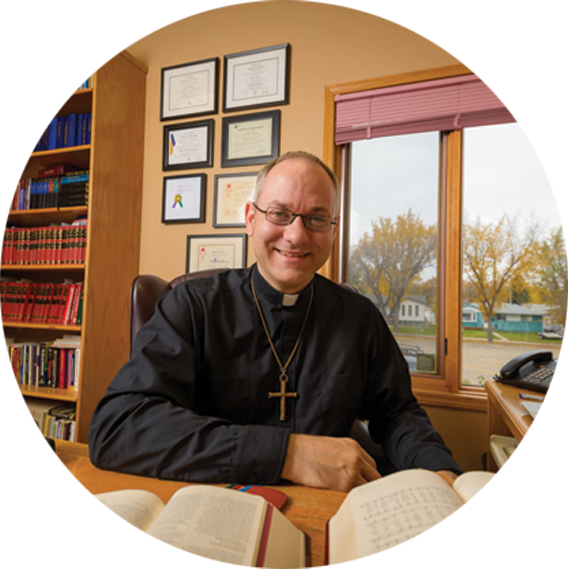In Review – Spider-Man: No Way Home
NOTE: Spoilers follow.
 by Ted Giese
by Ted Giese
At the end of 2019’s Spider-Man: Far from Home the villain Mysterio revealed to the world Spider-Man’s secret identity. Spider-Man: No Way Home begins with Peter Parker dealing with the pressures of suddenly being known publicly as Spider-Man, and discovering that this newfound fame/infamy negatively impacts his Aunt May, girlfriend MJ, and best friend Ned Leeds. To fix the problem, Parker appeals to the sorcery of Doctor Strange, hoping to alter reality so no one remembers Peter Parker is Spider-Man. When the spell goes awry, however, Parker and his friends are faced with a new problem as people from alternate universes who know Spider-Man’s secret identity are also drawn into this one.
The multiverse is one of the main themes in Phase Four of the Marvel Cinematic Universe, appearing in recent Disney+ television series like Loki and What If…? It’s also the focus of the upcoming film Doctor Strange in the Multiverse of Madness. In 2016’s Doctor Strange, the Ancient One describes the multiverse saying, “This universe is only one of an infinite number. Worlds without end. Some benevolent and life giving. Others filled with malice and hunger. Dark places where powers older than time lie ravenous… and waiting.” The multiverse then is a term for the aggregate of an infinite number of universes, parallel universes, and dimensions where every unintentional change and intentional decision branches off and creates a new reality existing simultaneously.
Second Chances
How does this idea play out in the new Spider-Man film? By drawing on Spider-Man films which have gone before. Since 2002, three actors have portrayed Spider-Man in live-action films: Tobey Maguire in Sam Raimi’s trilogy (2002, 2004, 2007); Andrew Garfield in Marc Webb’s The Amazing Spider-Man 1 and 2 (2012, 2014); and now Jon Watts’ Tom Holland, first introduced in 2016 as part of the Marvel Cinematic Universe. Reboots and re-imaginings of characters are often presented to the audience in a linear manner where the new supersedes the old. However, No Way Home takes these different Spider-Man stories and makes them contemporary to each other although occurring in different universes within the multiverse. As the story of No Way Home unfolds, Watts’ Spider-Man goes toe-to-toe with Raimi’s Doc Ock, Green Goblin, and Sandman, as well as Webb’s Lizard and Electro, portrayed by their original actors. These villains are pulled by Doctor Strange’s botched magic spell into Parker’s (Tom Holland) world because they know that Spider-Man is Peter Parker. But the Peter Parker of these other worlds also knows Spider-Man’s secret identity. So the versions of Spider-Man portrayed by Tobey Maguire and Andrew Garfield are also pulled into Parker’s (Tom Holland) world.
Confused? Don’t be. The film does a great job of sorting it all out. That said, those who watch this film without having seen the previous Spider-Man films may find it confusing. This film certainly rewards long-time Spider-Man franchise fans. The idea is not totally new however. Audiences saw something similar in 2018’s Spider-Man: Into the Spider-Verse, a big screen animated film which featured multiple versions of Spider-Man, including a female Spider-Man (Spider-Gwen), and even an anthropomorphic pig (Spider-Ham). There’s even a nod to that film during a brief interchange between Parker (Garfield) and Electro when Electro says he had expected Spider-Man to be African-American: “There’s gotta be a black Spider-Man out there somewhere.” The central character in Spider-Man: Into the Spider-Verse is Miles Morales, an African-American teenage boy.
If it seems unfair to bring questions of religion and Christianity into this film review, consider how one of the film’s comedic lines is a quip about another looking like they’re dressed a generic evangelical “youth pastor.” When the film itself includes Christian winks and nods it’s certainly fair to think about its content and ideas from a Christian perspective.
Watching all these actors from the past 20 years of Spider-Man films come together on the big screen in No Way Home is magical in itself. Even casual fans will likely get swept up in the experience of seeing their Spider-Man or their favourite villain interacting with the assembled characters brought together here. After the excitement settles down, though, viewers may be left with some big questions to chew on. Nerds and geeks have long mulled over the concept of parallel universes, time travel, mirror universes, pocket universes, and a variety of other related topics which now fall under the heading of multiverse. But even the average person has sometimes wondered what their life would be like if they had done something different in the past. In this way, No Way Home creates a story that invites viewers to think not only about the consequences of their actions but also regrets—not normally a topic served up for young viewers. The older wiser Peter Parker (Maguire) helps the younger less experienced Peter Parker (Holland) understand the dangers of ‘moral injury.’ Moral injury is when a person experiences trauma due to the violation of their moral compass, either at the hands of another or by their own actions or inactions. In Christian terms this would be described as sins committed against the person, as well as “by what we have done and left undone.” No Way Home also provides viewers an example of catharsis when Garfield’s Peter Parker succeeds in Holland’s Peter Parker’s universe at a moment where he had critically failed in his own.
No Way Home, with its strong emphasis on setting right what elsewhere had gone terribly wrong, is a film about second chances. The villains are likewise given second chances too. Finding themselves in a new world they are presented with new opportunities and new chances to be rescued, saved, and repaired physically, mentally, and spiritually. The question is: do they want that? The actors playing these villains also get a second chance to reprise their roles. Did Alfred Molina, Thomas Haden Church, Rhys Ifans, or Jamie Foxx ever expect to play these characters again? Likely not. Willem Dafoe’s Green Goblin is particularly outstanding and mesmerizing; he gives a performance crackling with the expertise of a seasoned and experienced performer. Each actor makes the most of what the script gives them to put the finishing touches on their respective characters.
Many Worlds
Despite the sci-fi drama it creates, the idea of a multiverse is not fictional. In the real world, this multiverse, originally known as the Many-Worlds Interpretation, arose from a dispute between physicists over a deterministic and indeterministic understanding of quantum mechanics—or, to put it, simply, “fate versus luck or chance.” In 1957 the physicist Hugh Everett proposed his Many-Worlds Interpretation as the Relative State Formulation based on a deterministic reality with each possible occurrence branching off into a new universe. This contradicted the Copenhagen interpretation built on the work of physicists Niels Bohr and Werner Heisenberg which argued that subatomic events are not caused but are rather determined by probability. Albert Einstein didn’t much like the Copenhagen interpretation of quantum mechanics because as he put it, “[God] does not play dice with the universe.” Einstein, after all, had developed his theory of special and general relativity based on the idea of causality and not probable randomness.
Within the context of No Way Home, Doctor Strange is a proponent of fate; he’s okay with using magic to bend fate to his will but ultimately believes certain things are predetermined—or, at the very least, that they should not be tampered with. He is not interested in any plan to rehabilitate the criminals he accidentally dragged into his world, instead favouring a plan to return them to their own worlds even if it means their certain deaths. But Holland’s Peter Parker, due to the influence of his Aunt May, doesn’t want to conform to the idea of fate. He believes in second chances. He’s willing to sacrifice his own life for the possibility of making things better for others. All three of the Peter Parkers share this desire and each makes the other a better Peter Parker than they would be alone. The thought that a Spider-Man movie could so skilfully tackle these ideas is somewhat mind-boggling. If Strange views the future cynically, Spider-Man views it optimistically. This difference dramatically impacts what these characters think is possible, regardless of whether they look at a problem fatalistically or hopefully; it also impacts their choices and actions.
Looping back around to reality, what are viewers to make of all this? If films are a kind of cultural catechism are there people who earnestly believe in the idea of the multiverse? What does your average viewer of a movie like No Way Home think of fate or chance? And what should Christians think of these things?
Christianity has historically taught that God is omniscient—that he knows perfectly everything that has happened, everything that could happen, and everything that will happen simultaneously. The only true ‘multiverse’ would then be in the mind of God, and thus hidden from human knowledge. But knowing that could exist doesn’t mean those probabilities exist in a real sense. This is why God forgives sins that have happened and will happen; there is no need to forgive sins that might happen. That God exists both inside and outside of time makes these questions interesting from His perspective, but humans cannot have perfect knowledge of this sort of thing. In fact, knowing all possible outcomes before they occur means God can promise “I will lead the blind in a way that they do not know, in paths that they have not known I will guide them. I will turn the darkness before them into light, the rough places into level ground. These are the things I do, and I do not forsake them” (Isaiah 42:16). God knows where the step will land before the foot ever hits the ground. Likewise: “The lot is cast into the lap, but its every decision is from the LORD” (Proverbs 16:33).
While fun and exciting in a Spider-Man movie, the idea of the multiverse is not compatible with a Christian understanding of reality. Christians believe what Scripture teaches that they “have been sanctified through the offering of the body of Jesus Christ once for all” (Hebrews 10:10). There cannot be universes in which Jesus failed at His work of salvation or a universe in which the Virgin Mary had a miscarriage. There cannot be a universe in which Jesus sinned or in which Adam and Eve did not fall. For Christians there is one world and one Jesus and “it is appointed for man to die once, and after that comes judgment” (Hebrews 9:27).
If it seems unfair to bring questions of religion and Christianity into this film review, consider how one of the film’s comedic lines is a quip about another looking like they’re dressed a generic evangelical “youth pastor.” When the film itself includes Christian winks and nods it’s certainly fair to think about its content and ideas from a Christian perspective.
A positive aspect of No Way Home is all three Peter Parker’s determination to love their enemies (Matthew 5:44) even in the face of adversity. Parker wants for them what he wants for himself: a second chance and a good reputation. The film encourages the audience to think about the restoration and redemption of things that are broken in this world. All people are called to care for the lives of others and to improve what they can. Christians know that ultimately this is accomplished in Christ Jesus who promises, “Behold, I am making all things new” (Revelation 21:5).
Many entries in modern film franchises succeed not just in ruining the new entries but in weakening, distorting, and vandalizing the films that preceded it (see, for example, the recent Star Wars trilogy). But No Way Home manages to actually pull together the preceding films and even make them better by tying up loose ends. This is no small feat.

The relationship between MJ and Peter Parker (Holland) in this film is really great. Zendaya and Holland have achieved something lacking in many MCU films: a grounded relationship that doesn’t feel tacked onto the film as a plot contrivance. They provide a lot of heart to a film with a lot of heart. Holland as Spider-Man has matured into his role, making him perhaps the best cinematic Spider-Man. Everything about his performance fits that optimistic hero slogging through one tragedy after another, including his willingness to make personal sacrifices for the good of others at his own expense. Watts clearly respects the work of the directors who came before him making a kind-hearted film that honours Spider-Man and the fans who love the character. There are moments that feel like a really good dream, like something too good to be true, but this is the power of hope. It isn’t often that audiences cheer and clap and literally jump up out of their seats with joy at each reveal and victory splashed across the screen.
———————
Rev. Ted Giese is lead pastor of Mount Olive Lutheran Church, Regina, Saskatchewan, Canada; a contributor to The Canadian Lutheran, Reporter; and movie reviewer for the “Issues, Etc.” radio program. For more of his television and movie reviews, check out the Lutheran Movie Review Index.



